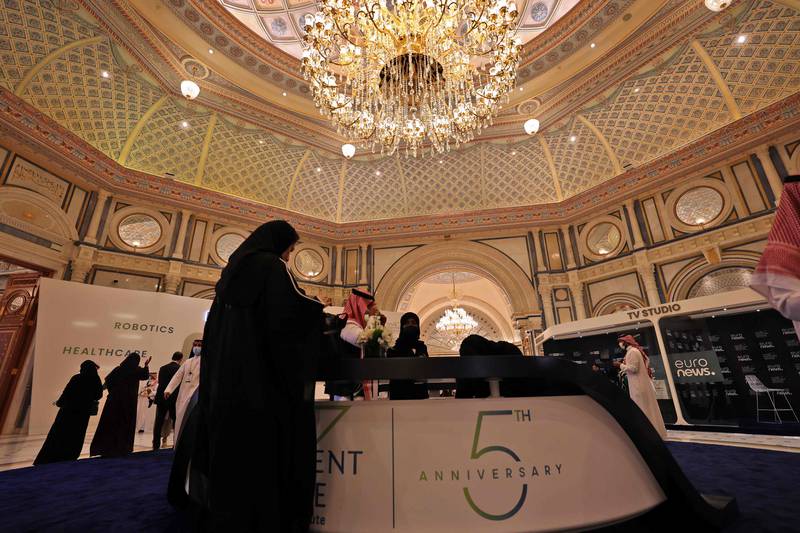FII: Invest in a balanced energy portfolio, Saudi Arabia's investment minister tells forum

Hydrocarbons will remain part of the economy for decades, raising the need to invest in a balanced portfolio as part of the transition to clean energy, Saudi Arabia's investment minister said on the first day of the kingdom's flagship investment forum.
Investment in green technology and associated infrastructure through public private partnerships could help in reaching carbon neutrality, said Khalid Al Falih said at the fifth Future Investment Initiative (FII) in Riyadh on Tuesday. The former energy minister also emphasised the need to invest in a broad spectrum of energy sources.
"We have to deal with carbon as part of our economy, as part of our ecosystem for decades to come," Mr Al Falih said at the annual event dubbed 'Davos in the desert', which attracts global company leaders and government officials.
"Maybe one day we will not need it when the technology and the infrastructure is there and the investment is done through public-private partnerships ... but during that transition we have to continue to invest in a balanced energy [portfolio] but also adapting to deal with the unfortunate side effects of climate change."
Many governments and investors are pushing back against investment in fossil fuels amid looming and serious threats of climate change that have prompted many countries to pledge net-zero carbon emissions by the mid-century. Prices of oil, natural gas and coal have surged this year as the global economy rebounds from the Covid-19 pandemic faster than expected amid supply chain disruption. Brent, the international benchmark under which two thirds of global oil trades, has increased about 65 per cent since the start of the year and is trading at more than $85 a barrel.
The push for investment in a balanced energy portfolio must also include national and international oil companies, Mr Al Falih said during the FII panel titled 'The evolving role of business and government'.
"Saudi Aramco and Adnoc and Kuwait Petroleum [Company], all of them also need to invest in the transition, so if we leave them in a corner, having to put all of the capital for fossil fuels, we're also depriving them and this region and other oil-rich regions from investing in a more balanced energy portfolio," the investment minister said.
The global investment community and financial markets must also come to this realisation, he said.
"This is not the job of the Nocs [national oil countries] or Opec+ countries to simply focus on investing in fossil fuels until we bridge [the gap to] renewables, I think we have to come to that understanding at a global level," Mr Al Falih said.
The minister said that investing in socially responsible categories of Environmental, Social and Governance (ESG) is a broad range that also includes low-carbon alternatives in the oil and gas industry.
"The financial markets have to be comfortable investing in this, in realising that this is not a binary – it's not zero or one. It's a spectrum. ESG should be seen as a spectrum, as a scorecard," he said. "And I believe if you score it right you will find many companies that are investing in oil and gas, which score very highly on the ESG."
About 87 per cent of 525 executives at leading businesses polled around the world said that ESG norms are part of their core objectives during the Covid-19 pandemic, according to a recent global survey commissioned by Abu Dhabi's Masdar. Around 85 per cent of those polled also viewed Covid-19 as a "wake-up call" for sustainability.
The ultimate challenge of climate change can only be addressed with governments and the private sector working together, Lord Gerry Grimstone, Minister of Investment of the UK, said on the panel.
"We have to leverage private sector investment," he said. "The next few years will see the biggest public-private partnerships that we will ever see in the world."
The world needs to rethink the social contract between governments and the private sector that previously led to "horrible levels of inequality and degradation of the planet", said Lady Lynn Forester de Rothschild, founding and managing partner of Inclusive Capital Partners.
On Saturday, Saudi Arabia, which is the world's largest exporter of oil, pledged to become carbon neutral by 2060 and more than double its annual emissions reduction target to 278 million tonnes by 2030.
The kingdom also plans to ensure that 30 per cent of the vehicles on the roads of Riyadh are electric by 2030. It plans to curtail its own emissions by adopting electric vehicles.
The announcements were part of a series of sustainability initiatives to come out of the country this week at the Saudi Green Initiative and Middle East Green Initiative forums.
